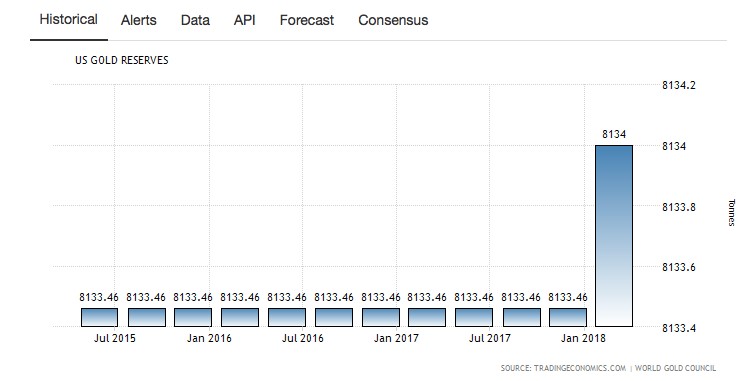Russia has scooped up another 300,000 ounces of gold the past month, according to Gold Seek, boosting is ever-growing reserves to 1,890 tonnes and coming that much closer to colluding with China to destabilize the dollar by dumping dollar-denominated assets.
China now has 1,842 tonnes of gold in reserve, based on official reported figures, but Beijing and Moscow aren’t the only dollar-targeting gold holders on the planet. It’s a trend now—and a growing one.
Globally, some 30 percent of all developed country reserves are stored in gold, with the U.S. holding 8,000 metric tonnes, followed by Germany with 3,000 metric tonnes and France and Italy with 2,500 metric tonnes each. That puts Russia in fifth place and China in sixth.

(Click to enlarge)
Russian gold miners produce some 300 tonnes a year, and the Central Bank buys almost all of that.
Russia has been on a major gold-buying spree for nearly a year, and it usually follows sanctions, and it’s all about developing a system in which the dollar won’t be necessary, as Russian news agency Pravda puts it.
“Interestingly, both Russia and China publicize and promote their accumulations of gold and publicly refer to gold as a strategic monetary asset. They make no secret of this. But on the flipside, the US does the opposite, and constantly downplays the strategic role of gold,” Singapore’s BullionStar precious metals expert Ronan Manly told RT in December.
Last year, Russia’s gold hoarding hit fever pitch:

(Click to enlarge)
This year will be more of the same, and all the more reason.
Countries aren’t just hoarding gold as a hedge against fears of financial collapse and geopolitical upheaval, they are also—amid increasing interest rates--withdrawing it from the U.S. Federal Reserve System—bringing it all back home.
The Turkish Central Bank has been withdrawing its gold reserves from the US Federal Reserve System and repatriating it, according to the World Gold Council. Turkey is among the top 10 gold reserve holders in the world, and the second-largest sovereign buyer now, after Russia. Related: China Goes Long On Gold
This is something new for Turkey, which has traditionally tried to keep its gold reserves at a fixed level and boost foreign exchange. The shift in strategy might be indicative of fears of possible U.S. sanctions, particularly over the Iran sanctions-busting case surrounding banker Reza Zarrab.
In the first week of April, according to Al-Monitor, Turkey’s central bank’s gross foreign exchange reserves dropped to $83 billion from $84.7 billion the previous week, while gold reserves stood at around $25.3 billion.
Earlier this month, the Turkish president said that international loans should be based on gold rather than dollars: “Why do you have to make the loans in dollars? Let’s base the loans on gold. We need to rid states and nations of exchange rate pressure. Throughout history, gold has never been a means of pressure.”
Others are also repatriating their gold, including Germany and the Netherlands, and many believe it’s because there’s fear in the air, and widespread anxiety about the dollar’s outlook under the Trump administration.
By Charles Benavidez for Safehaven.com
More Top Reads From Safehaven.com:
















